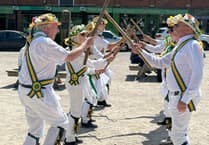THE death has been announced of an inspirational farmer, a man who made an immense contribution to agriculture, the countryside and rural communities in this country.
Sir John Quicke, who built the world-renowned cheese empire at Newton St Cyres, died on Monday, November 16, aged 87.
John Godolphin Quicke was born on April 20, 1922, and brought up in Newton St Cyres, where his family had lived since the 1540s.
He went to Eton College and studied chemistry at New College, Oxford, before joining the Royal Artillery and fighting in Burma during World War Two, when he became a captain.
After the War, Sir John studied agriculture and returned to the farm in 1947.
Six years later he married Prue Berthon, student of The Royal College of Art and daughter of Rear Admiral Peter Berthon.
Together they transformed the estate to create one of the first large dairy herds in the country.
He also formed a pig breeding company, Peninsular Pigs, which supplied all of Marks and Spencer's pork and a sheep breeding scheme to produce the hybrid breed, the Booroola.
He also replanted the estate woodlands to his wife's design.
In 1973 the couple built their own cheese dairy, which Prue ran and in 1979 they started selling the cheese independently of the Milk Marketing Board, starting the process that would lead to the well-known Quickes brand of traditional cheddar.
At that time, Sir John was working part-time for the Country Landowners' Association, becoming president in 1977. Because of his work for the CLA, he was awarded the CBE.
He retired from active farming in 1987 and handed over to his daughter, Mary and son-in-law, Tom Langdon-Davies.
He handed the estate to his eldest son, Dr John Quicke, and his other four children were given property and became partners in the family business.
Sir John was instrumental in establishing Responsible Use of Resources in Agriculture and on the Land (RURAL).
The organisation brought together those with agricultural and commercial interests with government representatives. It saw the UK take an international lead in combining the necessity to produce food, manage the landscape and the environment.
Sir John was awarded a knighthood for his services to agriculture following this work.
He enjoyed a rich spiritual life and it was in 1997 that he retired completely to devote his time to his garden at Sherwood House, which is home to a national collection of magnolias, Knaphill azaleas and berberis.
He was recently awarded the Rhodendron Society's Lifetime Achievement Award. The gardens open to the public as part of the National Gardens Scheme and in support of Newton St Cyres Parish Church.
Sir John died suddenly and without suffering, minutes after inspecting his collection of berberis and creating labels for newly identified plants. The day before he attended a Remembrance Day service in the village.
He leaves a widow, six children and 11 grandchildren.
A private funeral service was held at Newton St Cyres Parish Church and a memorial service is being arranged.
David Baker, chairman of Newton St Cyres Parish Council, said: "Sir John was a great supporter of the parish.
"On a number of occasions, he leased or donated land for community use including the village car park, allotments and land for a footpath from the village to the school.
"The parish's thoughts are with his family at this time."
Tributes have also been paid by representatives from the NFU and CLA.




Comments
This article has no comments yet. Be the first to leave a comment.